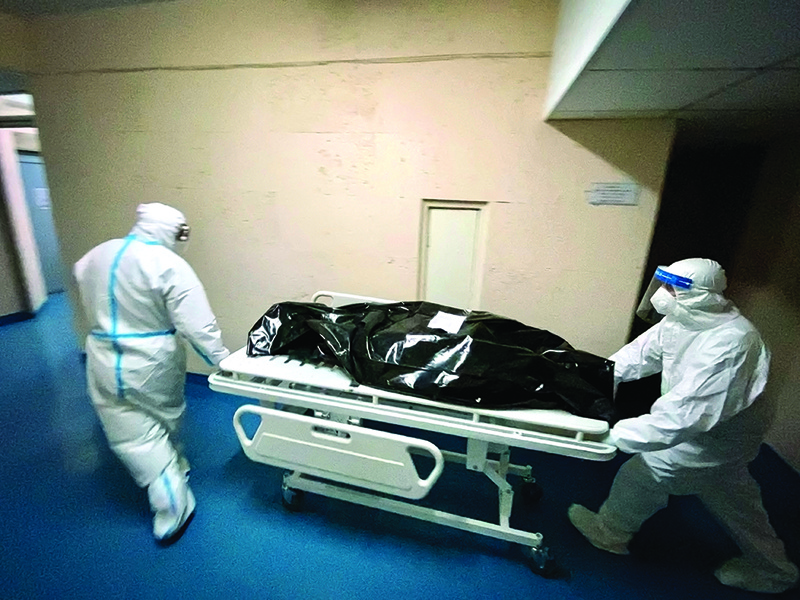 Two men wearing protection suits transport a COVID-19 patient's dead body to the hospital's morgue from the COVID-19 ICU unit at the "Emergency Institute" in Moldova's capital Chisinau.-AFP
Two men wearing protection suits transport a COVID-19 patient's dead body to the hospital's morgue from the COVID-19 ICU unit at the "Emergency Institute" in Moldova's capital Chisinau.-AFP
CHISINAU, Moldova: At the hospital in the small Moldovan town of Leova, exhausted doctors see no end to the pandemic: cases are rising, and vaccinations have only just begun. The first Moldovan was vaccinated at the start of March-more than two months after European Union member countries began inoculating their populations-and only thanks to donations from neighboring Romania, with which it has historically close relations. The two countries might share the same language, but offer a glimpse at the difference a border can make.
So far, non-EU member Moldova has received barely enough doses for three percent of its population, while Romania, an EU member since 2007, has already administered almost three million. "If Romania was not part of the EU, it would certainly have had a much harder time getting vaccines," says Sorin Ionita, a political analyst with the think tank Expert Forum.
Romania's liberal Prime Minister Florin Citu has said that the European Commission's handling of procurement helped avoid "chaos" in which "the highest bidder" would have received the most vaccines. It is part of the reason why Bucharest has refrained from criticizing the bloc's vaccine rollout, unlike other Eastern members like Hungary and Poland, Ionita says. This conciliatory position "is part of a broader policy of Bucharest, which, supported by a Europhile population, does not seek a fight with Brussels", he adds.
'Our only chance'
Moldova, a part of Romania until the Soviet Union annexed it in 1940, remains one of the poorest countries in Europe and has so far relied on vaccine donations-about 72,000 so far-from Bucharest. It received another 38,000 doses under the global Covax mechanism to help low- and middle-income countries fight the pandemic. In total, these donated vaccines would be enough to give about 110,000 people at least one dose, out of a population of 3.5 million.
The outlook remains bleak as "vaccination represents the only chance" to contain the pandemic, says Andrei Malasevschi, the hospital director in Leova, a city of about 8,000 nestled on the banks of the meandering Prut river that forms the border with Romania. "We didn't have the so-called 'waves'. The pandemic only grew and it continues to do so," he says. So far more than 4,800 people have died in the small nation.
At the Emergency Institute in Moldova's capital Chisinau, one of the biggest hospitals in the country, the number of ICU beds was expanded from 24 to 62 to cope with the influx of COVID-19 patients. The unit has nevertheless been 90 percent occupied for months and doctors and nurses are stretched to the limit, says Adrian Belii, head of the ICU unit and one of the country's most prominent physicians. The health system was already strained before the pandemic, in part because vast numbers of doctors and nurses have left to work in the EU.
Many sought employment in Romania when salaries for healthcare workers there doubled in 2018. "It is too early to consider vaccination of risk categories, let alone the general population," Belii says. If Moldova was a member of the EU, "as a large segment of the population dreams of, things would have been different," he adds.
Help from Russia?
While the number of cases continues to climb, Moldova's pro-European president Maia Sandu said she would try to "obtain rapid access to the Sputnik V vaccine" from Russia-an announcement that sparked fierce discussions among Moldovans. Since gaining independence from the Soviet Union more than 30 years ago, Moldova has been torn between Russia and the EU, and geopolitics is now shaping the pandemic response too. Disinformation campaigns are rampant, and local media have reported that healthcare workers in the pro-Russian region of Gagauzia refused the AstraZeneca vaccine, saying they would rather wait for Moscow's Sputnik V.
"We are very politicized. And when some hospitals say that they won't use a vaccine from Europe because they want the Russian one, we have a problem", Malasevschi says. Once vaccines are available for a larger part of the population, sociologist Victor Mocanu believes that mistrust will yield to the economic need of families dependent on remittances from the diaspora. "The approximately one million Moldovans who work abroad will want to be vaccinated as soon as possible as they won't be able to travel without a certificate," he predicts. - AFP










